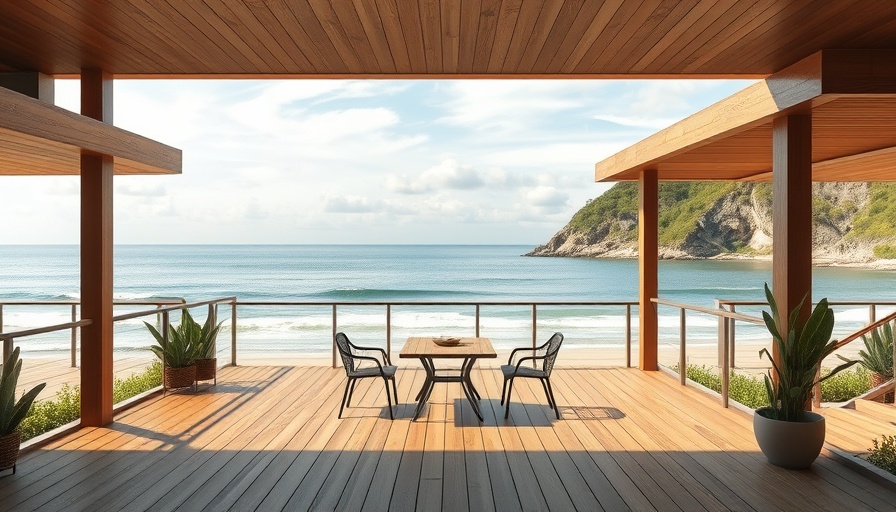
Deck Building Waste: A Growing Concern in Maryland
Every year, millions of tons of waste are produced from construction projects, with deck building contributing significantly to this figure. For Maryland homeowners who prioritize health and wellness, there’s an ethical choice at hand: creating environmentally friendly outdoor spaces. By engaging in sustainable construction practices, you can reduce your footprint while enhancing your home's value.
Embracing Green Deck Building Principles
Constructing a deck might seem like a straightforward task, but it carries implications for the environment that can no longer be overlooked. Beyond merely selecting the right materials, sustainable deck building focuses on waste reduction and minimizing ecological harm. This mindset is beneficial not just for the planet, but also for homeowners looking to maintain a healthy living space.
Environmental Impact of Traditional Deck Building
Traditional deck building often relies on materials and practices that lead to significant environmental issues. From deforestation caused by wood harvesting to pollution from the chemicals used in pressure-treated lumber, the negative impacts are pervasive. By understanding the environmental impacts associated with conventional construction, homeowners in Maryland can make informed decisions to cut down on waste and use greener building methods.
Comparing Traditional and Sustainable Practices
Let's break down how traditional practices stack up against sustainable approaches:
Material Sourcing: Conventional methods often rely on harvesting wood, which can lead to habitat destruction, whereas sustainable practices favor reclaimed or recycled materials.
Waste Management: Significant waste typically accumulates during traditional builds due to poor planning, but sustainable construction can minimize waste through careful calculation and planning.
Chemical Use: Traditional practices frequently involve harmful chemicals found in pressure-treated wood, while sustainable methods aim to utilize non-toxic alternatives.
The Benefits of Waste-Conscious Construction
Using waste-conscious methods during construction yields numerous benefits:
Reduced Landfill Waste: Thoughtful planning can significantly lower the amount of waste sent to landfills.
Conservation of Resources: Sourcing recycled and sustainable materials helps preserve natural resources.
Lower Environmental Impact: Building with consideration for the environment leads to a healthier surrounding ecosystem.
Local Regulations and Sustainable Building Codes
In Maryland, the emphasis on sustainable building is reflected in local regulations. Following the guidelines set forth in Canadian building codes, homeowners are encouraged to utilize durable and eco-friendly materials when constructing their decks. For instance, selecting strong deck railings enhances the safety and longevity, ensuring your outdoor area remains functional and attractive for years to come.
Choosing Eco-Friendly Decking Materials
As the demand for eco-friendly options rises, many homeowners are exploring materials that not only promote sustainability but also boast aesthetic appeal. For instance:
Bamboo: This material is fast-growing, incredibly strong, and resilient to moisture. Plus, it helps reduce carbon dioxide levels, making it environmentally beneficial.
Recycled Plastic Decking: Formed from repurposed plastics destined for landfills, this option resists rot and insect damage while requiring minimal maintenance.
Composite Decking: A clever blend of wood fibers and plastic, composite materials mimic the look of wood while offering enhanced durability and longevity.
Step-by-Step Guide to Eco-Friendly Deck Construction
Ready to start your sustainable deck project? Here’s a simple roadmap to guide you:
Plan Properly: Map out your deck’s design carefully to ensure you minimize waste.
Source Responsibly: Choose eco-friendly materials from local suppliers to reduce your carbon footprint.
Consult Experts: Collaborate with professionals who understand sustainable practices and can guide you through the process.
Incorporate Green Features: Consider adding features like rainwater collection systems to benefit your surrounding garden.
Final Thoughts: Building for a Greener Tomorrow
Deck construction presents a unique opportunity for Maryland homeowners to make a positive environmental impact. With the right knowledge and materials, creating a sustainable outdoor retreat can benefit not only your health and wellness but also the planet. So, why not take the plunge into eco-friendly building and enjoy the lasting beauty of your new deck?
As you embark on your next home improvement project, consider how your choices contribute to a broader climate-focused future. Discover the satisfaction of building with care, knowing you’re playing a pivotal role in this vital boost for Maryland's environment!
 Add Row
Add Row 
 Add Element
Add Element 


Write A Comment